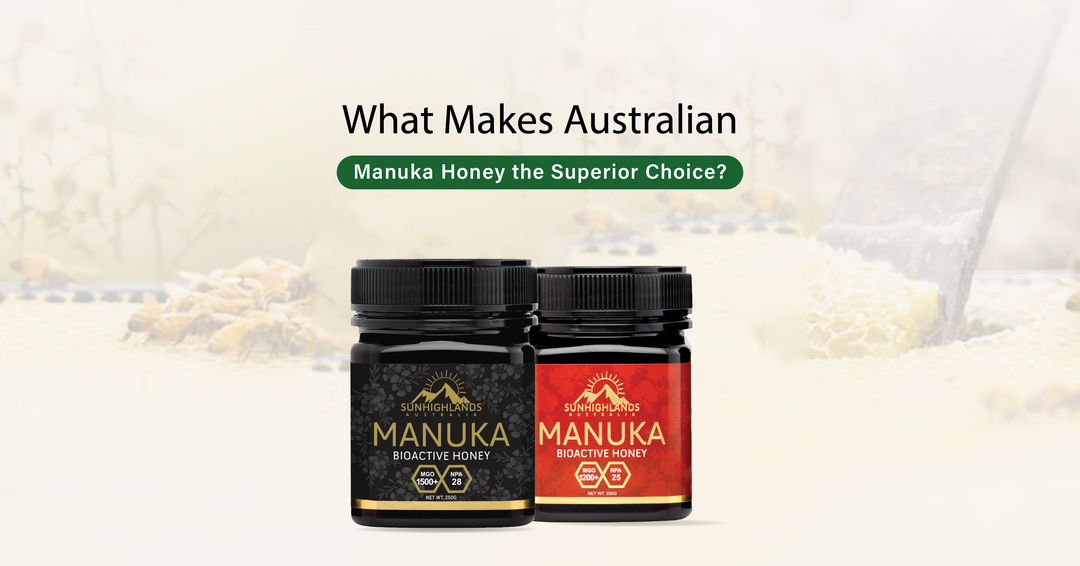Manuka Honey vs Raw Honey: Which is Healthier and Why?

Have you ever wondered why honey is considered one of the most cherished natural ingredients. We will tell you why, honey is a natural immune boosting sweetener that is rich in sugar (glucose and fructose), enzymes, amino acids, minerals and antioxidants offering numerous health benefits. While many are familiar with raw honey, another type that stands out due to its unique properties is Manuka Honey. So, what is the difference between Manuka honey and normal honey, and which one should you add to your pantry?
What is Manuka honey?
Bees that feed on the blooms of the Manuka tree, a native of New Zealand, create manuka, honey. The native Maori people have been using this honey for its therapeutic powers for years. Methylglyoxal (MGO), a substance found in manuka honey, is what gives it its antibacterial and antifungal qualities.
What is raw honey?
Raw honey is uncooked and hasn't been filtered or pasteurized in any way. This indicates that it has all of the essential nutrients, natural enzymes, and antioxidants that are normally lost during the manufacturing of regular honey.
Differences between Manuka honey and raw honey
1- The manufacturing process
Bees that consume the Manuka tree's nectar produce manuka, honey. On the other hand, depending on the region, any kind of flower can be used to make raw honey.
2- Nutrient content
Compared to raw honey, manuka honey has a higher nutritional content. More antioxidants, amino acids, vitamins, and minerals are present in it. In comparison to raw honey, Manuka honey has higher concentrations of methylglyoxal (MGO), which is what gives it its antibacterial qualities.
3- Possibilities for healing
Compared to raw honey, manuka honey has more potent healing effects. It is used to treat a variety of ailments, such as bacterial infections, sore throats, burns, wounds, and burns. On the other hand, the primary benefits of raw honey are its antibacterial and anti-inflammatory properties.
4- Price
Manuka honey costs more than raw honey because of its superior nutritional and therapeutic potential.
Manuka Honey for the Immune System
Immune system stimulation is a well-known benefit of manuka honey. It is efficient against a variety of dangerous bacteria and viruses due to the high quantities of MGO present. Antioxidants included in Manuka honey can also aid in reducing inflammation and boosting the immune system.
Studies have shown that manuka honey is beneficial against a range of diseases, including antibiotic-resistant bacterial strains. Moreover, it has been demonstrated to enhance intestinal health, which is crucial for preserving a strong immune system.
Also Read: TOP AUSTRALIAN MANUKA HONEY BRANDS 2023
Raw Honey for the Immune System
Enzymes, minerals, and antioxidants found in raw honey can assist the immune system. Natural sugars found in raw honey can give the body a rapid source of energy.
It has been demonstrated that raw honey possesses antibacterial qualities that can help stave against illnesses. Moreover, it has been demonstrated to enhance digestion, which is crucial for the overall functioning of the immune system.
Which one is better for the Immune System: Manuka Honey or Raw Honey?
The immune system can be strengthened with the help of both raw honey and Manuka honey. Yet, because it contains a lot of MGO, Manuka honey might be more effective. According to studies, Manuka honey is superior to raw honey in terms of its antibacterial and antifungal capabilities.
In contrast to Manuka honey, raw honey has a greater array of nutrients and antioxidants. It is also more effective against a wider variety of infections thanks to its more varied antibacterial characteristics.
Which one is healthier?
Both raw and Manuka honey have several health advantages. In contrast to raw honey, Manuka honey has a higher nutritional and therapeutic value. In comparison to raw honey, it has higher levels of antioxidants, amino acids, vitamins, and minerals as well as the antibacterial compound methylglyoxal (MGO).
Wounds, burns, sore throats, gastrointestinal problems, and bacterial infections are just a few of the diseases that are treated with manuka honey. Moreover, it is successful in treating IBS, stomach ulcers, and other digestive problems.
On the other hand, the primary uses of raw honey are as an antibacterial and anti-inflammatory agent. It works well to treat stomach problems, allergies, colds, and the flu.
What is the Difference Between Manuka Honey and Raw Honey?
Both Manuka honey and raw honey are organic and pure forms of honey, their main difference is in their natural composition and origin.
Manuka Honey is derived from the nectar of the Leptospermum scoparium plant, mainly found in wilderness of Australia. It contains a special compound called methylglyoxal (MGO), which is believed to be the reason for its potent antibacterial properties. Manuka honey is graded on its MGO content. Higher MGO levels indicate stronger antibacterial activity.
Raw Honey is the purest form of honey that has been collected directly from beehives and has not been processed or pasteurized. Raw honey has variety of benefits because it comes from various types of flowers and is collected by bees in different regions. Typically when natural honey is pasteurized, it loses its natural enzymes, antioxidants, and pollen but it is not the case with raw honey.
Raw Honey vs Manuka Honey: Health Benefits
Here is a comprehensive comparison between the health benefits of Manuka honey raw honey.
- Manuka Honey is enriched with antibacterial and anti-inflammatory properties. It has been in medicinal use mostly to treat wounds, soothe sore throats, and support digestive health. Manuka honey's high MGO content makes it an effective ally in fighting harmful bacteria, which is why it’s a popular choice for therapeutic use.
- Raw Honey is also packed with antioxidants, vitamins, and minerals. It supports immune function, aids digestion, and helps with allergies. Raw honey’s health benefits come from the natural enzymes and antioxidants that remain intact due to minimal processing. Raw honey doesn't have MGO, so it may not have the same potent antibacterial properties as Manuka honey.
Comparing Honey Varieties: Manuka and Raw
- Antibacterial Properties: The standout feature of Manuka honey is its high MGO content which provides unique antibacterial effects. While raw honey also has natural antibacterial properties, they are generally less potent compared to those in Manuka honey. This makes Manuka honey the go-to choice for more targeted medical uses.
-
Nutritional Value: Both honeys contain similar levels of calories, sugars, and antioxidants. However, Manuka honey may have higher concentrations of specific antioxidants like methylglyoxal , which is unique to its type. The table shows nutritional composition per 100gms of both honeys.
|
Nutrient |
Manuka Honey |
Raw Honey |
|
MGO |
Present |
Not Present |
|
Glucose |
31gm |
30gm |
|
Soduim |
0gm |
0gm |
|
Fats |
0gm |
0gm |
|
Proteins |
0.3gm |
0gm |
|
Fructose |
38gm |
37gm |
- Taste and Texture: Manuka honey has a stronger, more distinct earthy flavor than raw honey, which varies based on the flowers from which it is sourced. Raw honey is often milder in taste where as Manuka honey is a bit bitter and an acquired taste.
Which is Healthier? Manuka Honey vs Raw Honey
When considering which honey is healthier, it really depends on your needs:
- Manuka honey is ideal for those seeking more targeted health benefits, such as treating infections or promoting gut health. Its superior antibacterial properties make it particularly useful for wound care and digestive support.
- Raw honey, while not as potent in antibacterial effects, is an excellent choice for general wellness. It’s rich in enzymes and antioxidants, making it beneficial for boosting immunity and aiding in overall health maintenance.
How to Choose Between Manuka Honey and Raw Honey
Choosing between Manuka and raw honey depends on your health goals. If you're looking for a natural remedy for infections or digestive issues, Manuka honey may be the better choice due to its higher potency. However, if you’re simply looking to enjoy the general health benefits of honey, raw honey is a great option for daily use.
In conclusion, both Manuka honey and raw honey offer significant health benefits, but their differences in composition and properties mean they are suited to different uses. Whether you prefer the medicinal strength of Manuka honey or the natural goodness of raw honey, both varieties provide a nutritious addition to your diet.
Conclusion
In conclusion, raw honey and Manuka honey both have a variety of health advantages. In contrast to raw honey, Manuka honey has a higher nutritional and therapeutic value. Many diseases, such as wounds, burns, sore throats, digestive problems, and bacterial infections, can be successfully treated with it. On the other hand, the primary uses of raw honey are as an antibacterial and anti-inflammatory agent.
It works well to treat stomach problems, allergies, colds, and the flu. The decision between Manuka honey and raw honey ultimately comes down to your financial situation and health requirements.





